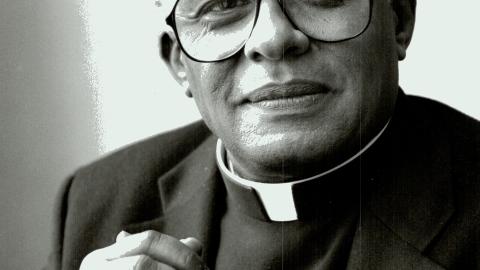Bishop Macram Gassis envisioned a modern, Christian civilization in the most inhospitable of circumstances, in Sudan. For nearly four decades, until shortly before his death last Sunday at age 84, the Catholic bishop worked tirelessly to execute that vision, putting his own life at risk many times. He was an extraordinary hero.
His Diocese of El Obeid spanned a war-ravaged area, three times the size of Italy, that included Sudan’s Nuba Mountains and part of its south. A largely undeveloped wilderness, with only the most rudimentary economy, it was targeted in genocidal repression by an Islamist military dictatorship that held power in Khartoum for 30 years, until its overthrow in 2019.
Having been ordained a missionary priest with the Comboni religious order, Bishop Macram was foremost a pastor. When he made the vast circuit around his diocese, he baptized, confirmed and ordained Catholics by the hundreds. He blessed their marriages and prayed for their dead. One unforgettable photo shows an endless line of brilliantly clothed Sudanese men, women, and children lined up, in the vast bush at an open-air liturgy, to receive Holy Communion from the bishop, who, in turn, is elegantly robed and wearing a miter as if in a great cathedral. His actual cathedral and churches were deliberately targeted by Sudan’s government bombs. Despite the dangers, he had incredible success in recruiting priests and nuns to help him preach the gospel and carry out good works.
To Bishop Macram, honoring human dignity meant that everyone must be educated, cared for, and respected — women, Catholics, Protestants, Muslims, followers of traditional practices, and the young and the old. Over time, he forged a civil society, one that provided churches, schools, hospitals, maternity and health clinics, teacher-training centers, hundreds of bore wells for clean water, and rectories and convents. On rickety planes, he flew in humanitarian supplies and much-needed materials, including bags of cement. He persuaded architects, accountants, and health professionals to join him. That required him to travel throughout the West, begging for aid. During the height of the religious persecution in El Obeid diocese, he was shunned by Theodore McCarrick, now defrocked, who at the time was a powerful cardinal and the archbishop of Washington, D.C. But as a regular guest of Raymond Arroyo on EWTN, Bishop Macram would speak passionately about the needs of his besieged diocese, and an outpouring of support would follow.
One of Bishop Macram’s extraordinary successes, lauded even in the New York Times, was Mother of Mercy Hospital in the remote Nuba Mountains. He launched the undertaking in the early 2000s, while recovering from cancer. It is the only modern hospital for hundreds of miles, serving a population of over a million. In 2008, he hired Tom Catena, an American physician and a legend in his own right. Dr. Catena is still there, now assisted by dozens of registered nurses and pharmacists and the first team of qualified Nuban physician assistants. Catena met the bishop through the latter’s personal doctor, the surgeon Deirdre Byrne, a nun in Washington, D.C., who belongs to the Little Workers of the Sacred Heart. Inspired by the bishop, she too has traveled to Mother of Mercy, to perform surgery.
The bishop also dared to raise his voice against the violent attacks by the former government. In 2014, the Associated Press reported on his protests following eleven bombings targeting the hospital over two days. I first met Bishop Macram in the early 1990s at a U.N. human-rights conference, in Geneva, Switzerland, where I was part of the U.S. delegation. There to testify about the massacres in his native Sudan, he was one of the few church leaders to speak out (as he also did before the U.S. Congress) — on ongoing atrocities against religious freedom in that region and to warn against the growing threat of Islamist terror. That distinction incurred a government arrest warrant and put his life on the line every minute he was in Sudan.
After some of the bishop’s flock had been freed from slavery, including sexual enslavement, in Khartoum, I asked him, What does a preacher say to these deeply traumatized survivors? He said he told them to hold their heads high because “you, too, are loved as children of God, who taught that all of us should call him Abba, Father.” He also preached to us Westerners. “My people are not mendicants,” he told me, explaining that, though they ask for material aid, their witness to the faith in the face of extreme persecution is a lesson of deep spiritual devotion for the Western church. By 2000, more than 2 million Nubans and southern Sudanese, mostly Christian, had been killed by Khartoum through armed raids on villages and intentional mass starvation. He pleaded in his Christmas letters: “Please keep us in your prayers. My flock is on the via crucis. Our crucifixion still continues.”
His courage stemmed from his faith. He devoted his life to God and his church. He delighted in telling Westerners stories about the Nuba, Dinka, Nuer, and other people of his diocese, making the humanity of “his people” come alive. Notably, while Sudanese by national origin, his ethnic background was Arab, while “his people,” those to whom he dedicated his life, are African, of varied religious backgrounds. In the same spirit, he served as a bridge between East and West, at home and among friends in both places.
Bishop Macram will be greatly missed.

















